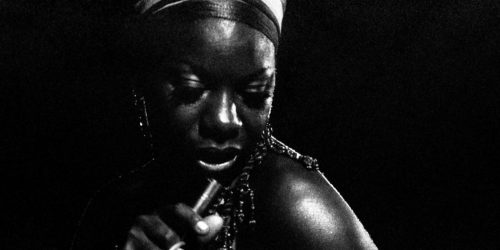
Lately, between Andresmusictalk and my own blog Dystopian Dance Party, I feel like I’ve been writing a lot about Nina Simone. Not that I’m complaining, of course. Simone is one of my all-time favorite artists: a bold and daring a performer who nevertheless carried herself with an imperious dignity that earned her the title “High Priestess of Soul.” And, especially in the late 1960s, her voice as a radical Black woman made vital contributions to the very culture that marginalized her.
Take, for example, her 1966 song “Four Women,” an emotional portrait of the manifold ways African American women have been oppressed throughout history. Over an ominous blues piano line, Simone lends subjectivity to four archetypal figures: the dark-skinned slave “Aunt Sarah,” the mulatto “Safronia,” the Jezebel/prostitute “Sweet Thing,” and finally the embittered militant “Peaches.” With her last verse, she declares that the rage at the heart of the Black Civil Rights movement is both inevitable and justified by the indignities of the past; “I’m awfully bitter these days,” she admits, “because my parents were slaves.” And in inhabiting these figures–widely perceived as negative, racist stereotypes–she gives them a sense of humanity and empathy that could not be found in the women’s movement of the time.
The place of Black women in feminism has of course been contested since the days of Sojourner Truth; it remains, unfortunately, an ongoing struggle, seen most recently in debates leading up to this January’s Women’s March on Washington. But with songs like “Four Women,” Nina Simone ensured that the uniqueness of Black women’s experiences were expressed, whether “mainstream” feminism chose to acknowledge them or not. And her music continues to resonate–as evidenced by the above cover version, performed by the Berklee College of Music chapter of Black Lives Matter. It is, as ever, sad that a song written about the plight of Black women in 1966 could remain so necessary over 50 years later; things being as they are, however, at least now we can be glad it exists.
Remember to check out Dystopian Dance Party next week for five more days of music by great women artists! See you soon.
